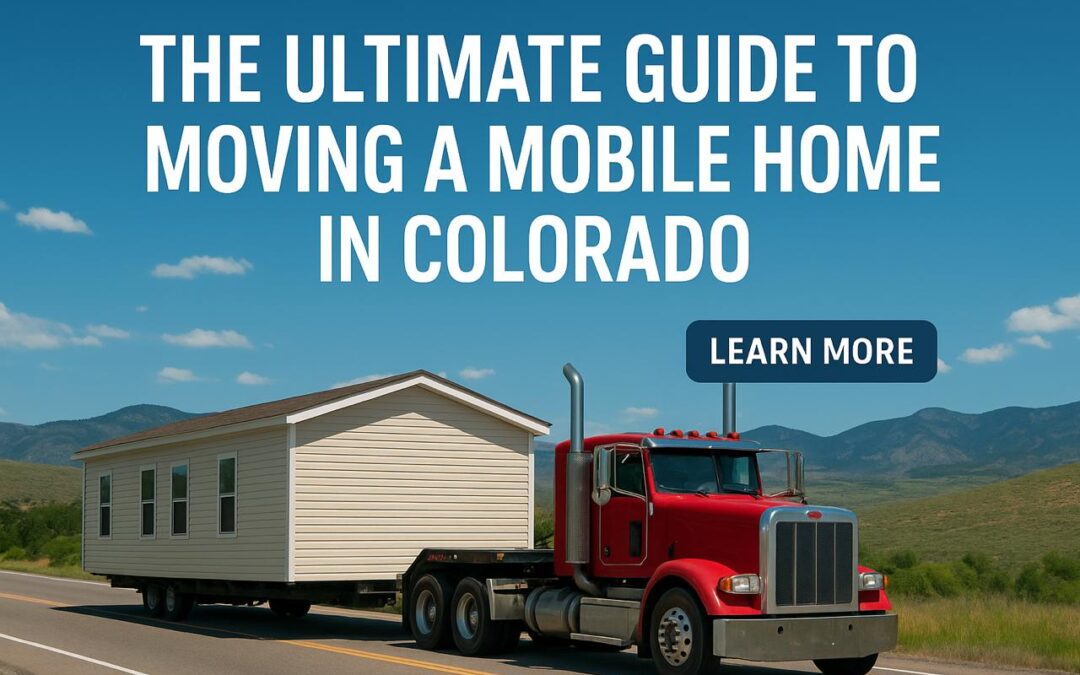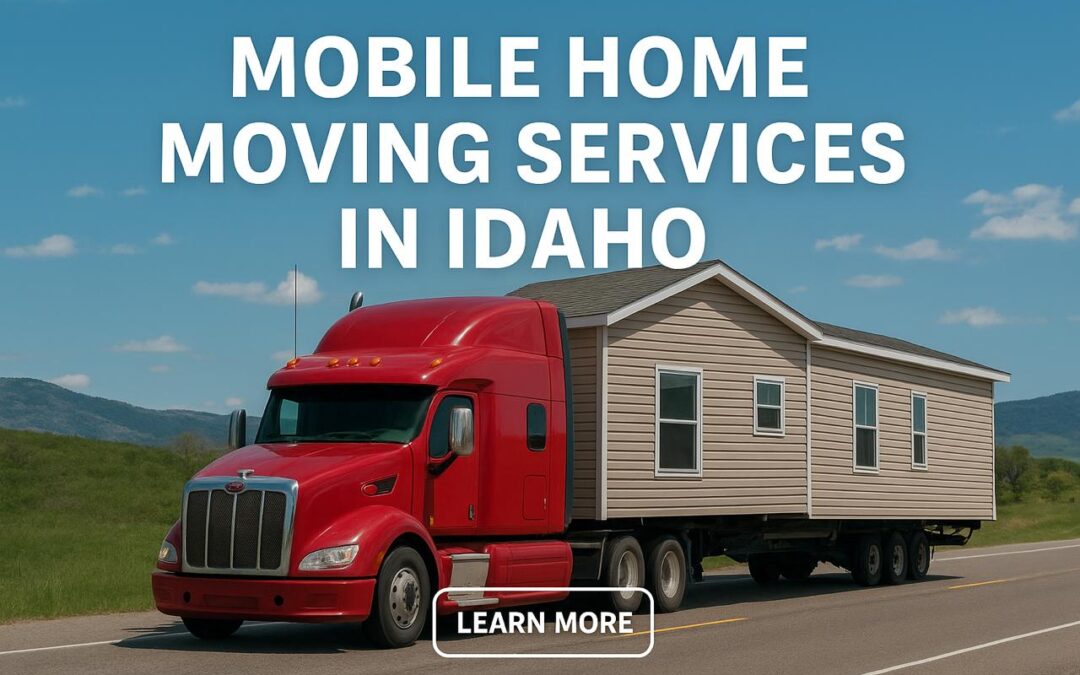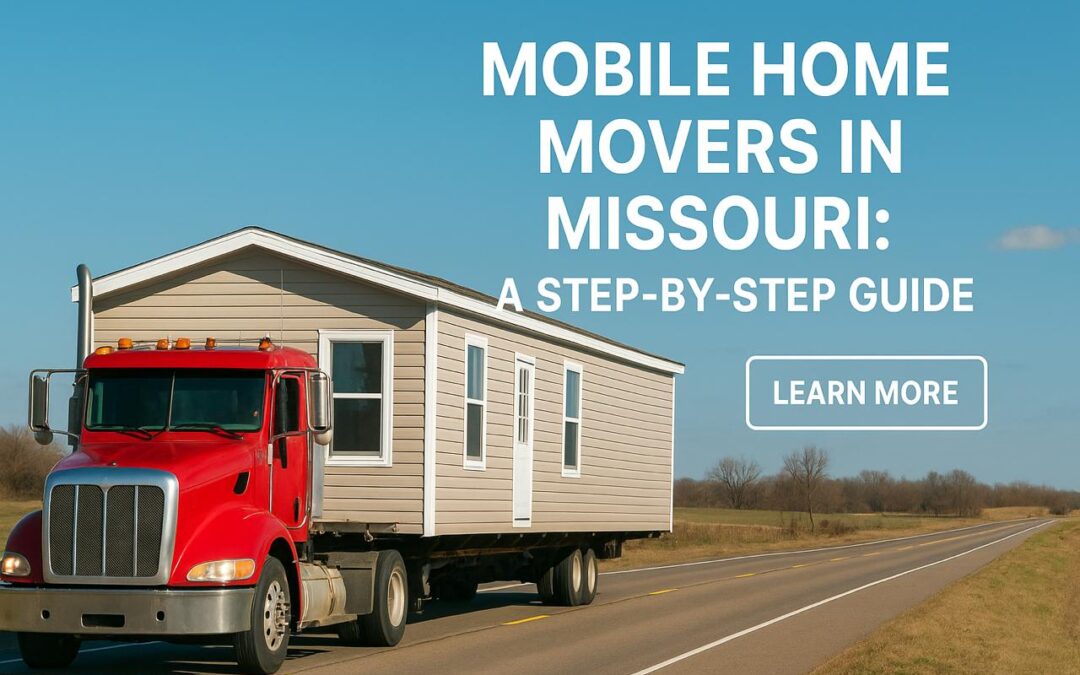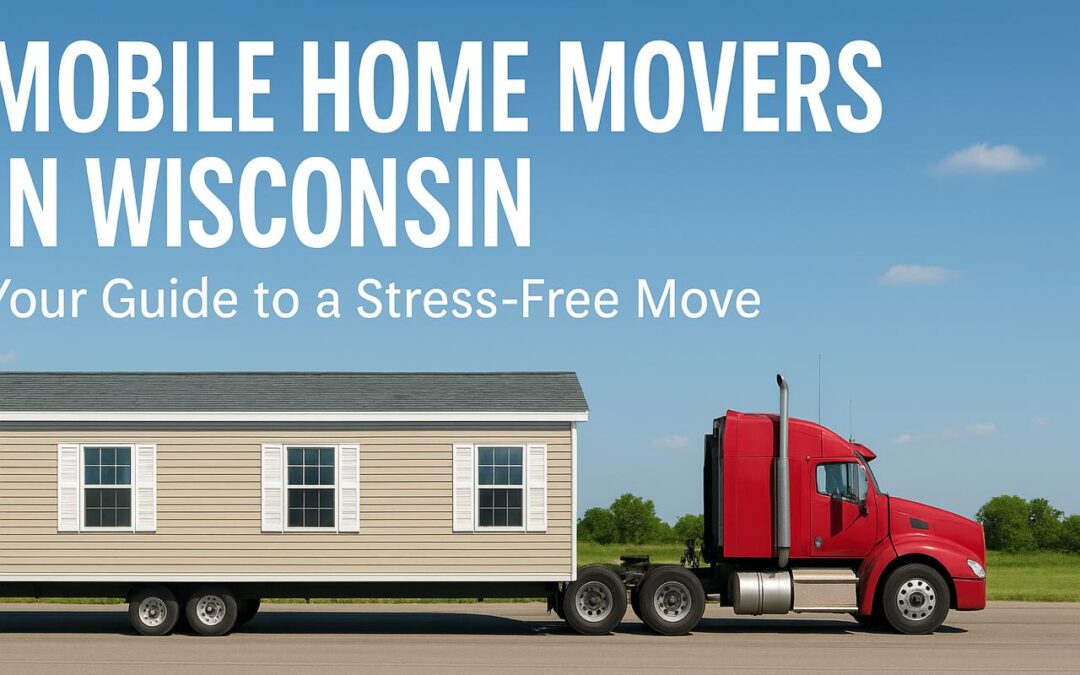
by info@mobilehomemovingcompanies.com | Sep 14, 2025 | Uncategorized
Relocating a manufactured or modular home is a major task that requires the right planning, permits, and expertise. If you’re looking for mobile home movers in Colorado, this guide covers everything you need to know—from permits to costs to tips for a smooth move in the Centennial State.
Why Hire Professional Mobile Home Movers in Colorado?
Moving a mobile home isn’t as simple as hitching it to a truck. Here’s why Colorado homeowners rely on licensed movers:
- State Permits: Colorado requires permits for oversized loads and specialized routes. Movers manage the paperwork with the Colorado Department of Transportation.
- Specialized Equipment: From hydraulic lifts to escort vehicles, movers have the tools to safely transport your home.
- Insurance Protection: Licensed movers provide insurance to protect your home during transit.
- Efficiency & Expertise: Professionals handle teardown, transport, and reinstallation quickly and securely.
Learn more about what movers offer on our services page.
The Mobile Home Moving Process in Colorado
1. Planning & Permits
Movers plan the route, obtain state permits, and arrange escort vehicles if required.
2. Preparation
Before moving day, homeowners should:
- Disconnect utilities (water, electricity, gas, sewer).
- Remove skirting, decks, porches, or external structures.
- Secure doors, windows, and fragile items.
3. Loading & Transport
Movers lift the home with hydraulic jacks, place it on a trailer, and transport it. Escort vehicles accompany oversized homes as needed.
4. Delivery & Setup
At the destination, movers level and secure the home, reconnect utilities, and reinstall skirting or porches if included in the service package.
For moving tips and advice, visit our blog.
Costs of Mobile Home Movers in Colorado
Moving costs in Colorado depend on:
- Distance: Local moves are less expensive than long-distance relocations.
- Home Size: Double-wides and larger homes require more labor and equipment.
- Permits & Escorts: Costs vary based on state regulations and route requirements.
- Setup Services: Complete teardown and reinstallation add to the total.
On average, Colorado homeowners can expect to pay $5,000 to $14,000 depending on distance and complexity. For a custom quote, request a consultation through our contact page.
Tips for a Smooth Mobile Home Move in Colorado
- Start Early: Begin preparations 2–3 months ahead of your move.
- Confirm Licensing: Always verify that your mover is licensed and insured in Colorado.
- Budget Wisely: Include permits, escorts, and utility reconnections in your budget.
- Protect Your Home: Remove valuables and secure fragile items.
- Stay Connected: Maintain open communication with your movers throughout the process.
Popular Areas for Mobile Home Moves in Colorado
- Denver: Urban relocations require traffic coordination and special permits.
- Colorado Springs: Moves across residential areas with growing mobile home communities.
- Fort Collins: Local and long-distance relocations for families and retirees.
- Grand Junction: Specialized moves requiring mountain route planning.
Final Thoughts
Hiring experienced mobile home movers in Colorado ensures your relocation is safe, legal, and stress-free. From permits to setup, professional movers handle the details so you can focus on enjoying your new home. Explore our services or contact us to get started today.

by info@mobilehomemovingcompanies.com | Sep 14, 2025 | Uncategorized
Relocating a manufactured or modular home in Idaho requires expert knowledge, proper permits, and the right equipment. If you’re searching for mobile home movers in Idaho, this guide will walk you through the process, costs, and tips for a stress-free move across the Gem State.
Why Hire Professional Mobile Home Movers in Idaho?
Mobile home relocation is a complex task that requires specialized skills. Here’s why Idaho homeowners rely on licensed movers:
- State Regulations: Idaho requires permits for oversized loads. Professional movers handle all paperwork with the Idaho Transportation Department.
- Specialized Equipment: From hydraulic lifts to pilot cars, movers use the right tools to move homes securely.
- Insurance & Protection: Licensed movers carry insurance to safeguard your home during transport.
- Efficiency: Professionals handle teardown, transport, and setup quickly and safely.
For more details on professional services, check our services page.
The Mobile Home Moving Process in Idaho
1. Planning & Permits
Movers obtain state and local permits, plan safe routes, and arrange escort vehicles if required.
2. Preparation
Homeowners must:
- Disconnect utilities (water, electricity, gas, sewer).
- Remove skirting, decks, porches, or external structures.
- Secure windows, doors, and fragile items.
3. Loading & Transport
Movers lift the home with hydraulic jacks, load it onto a trailer, and transport it with escort vehicles when necessary.
4. Delivery & Setup
At the destination, movers position, level, and secure the home. They reconnect utilities and reinstall decks or skirting if part of the package.
For expert moving advice, visit our blog.
Costs of Mobile Home Movers in Idaho
The cost of moving a mobile home in Idaho depends on several factors:
- Distance: Local relocations cost less than cross-state moves.
- Home Size: Double-wides or modular homes require more labor and equipment.
- Permits & Escorts: State regulations affect total expenses.
- Setup Services: Teardown and reinstallation services add to costs.
On average, homeowners in Idaho can expect to spend $4,500 to $13,000 depending on distance and services. For a tailored estimate, request a consultation through our contact page.
Tips for a Smooth Mobile Home Move in Idaho
- Plan Ahead: Start preparations at least 2–3 months before your move.
- Confirm Licensing: Always ensure your mover is licensed and insured in Idaho.
- Budget Properly: Factor in permits, escorts, and utility reconnections.
- Protect Your Home: Remove fragile belongings and secure openings.
- Stay in Communication: Keep close contact with your moving company.
Popular Areas for Mobile Home Moves in Idaho
- Boise: Urban relocations often involve navigating busy streets and city permits.
- Idaho Falls: Movers here frequently handle long-distance and rural moves.
- Twin Falls: Known for community-to-community relocations.
- Coeur d’Alene: Moves in this region may require special route planning through mountainous terrain.
Final Thoughts
Hiring expert mobile home movers in Idaho ensures your relocation is smooth, compliant, and stress-free. With the right movers, you can rest easy knowing your home is in good hands. Start planning today by reviewing our services or contacting us for a customized moving plan.

by info@mobilehomemovingcompanies.com | Sep 14, 2025 | Uncategorized
If you’re planning to relocate a mobile home in the Show-Me State, finding experienced mobile home movers in Missouri is essential. Moving a manufactured or modular home is more than just hitching it to a truck—it involves permits, specialized equipment, and skilled professionals who understand the process. This step-by-step guide will walk you through everything you need to know about moving your mobile home in Missouri.
Why Hire Mobile Home Movers in Missouri?
Relocating a mobile or manufactured home is no small task. Here’s why Missouri homeowners turn to licensed movers:
- Permits & Regulations: Missouri requires permits for oversized loads. Professional movers handle all the paperwork with the Department of Transportation.
- Specialized Equipment: Hydraulic lifts, custom trailers, and escort vehicles ensure your home is moved safely.
- Insurance Coverage: Licensed movers provide insurance protection during transit.
- Efficiency: Experienced crews manage teardown, transport, and setup quickly and professionally.
For a list of services available, check our services page.
Step 1: Planning and Permits
The first step in relocating your mobile home is planning. Movers apply for the necessary state permits and plan the safest route for your home’s journey.
Step 2: Preparing Your Home
Before the move begins, you’ll need to:
- Disconnect all utilities (water, gas, electricity, sewer).
- Remove skirting, decks, porches, or external structures.
- Inspect your home for structural soundness.
Step 3: Loading and Transport
Movers carefully lift the home using hydraulic jacks and place it onto a specialized trailer. Escort vehicles are arranged if required by law.
Step 4: Delivery and Setup
Once at the new location, movers will:
- Position and level your home.
- Reconnect utilities.
- Reinstall skirting, porches, or decks if part of your package.
For more moving insights, visit our blog.
Costs of Mobile Home Movers in Missouri
The cost of moving a mobile home in Missouri varies based on:
- Distance: Local moves are more affordable than long-distance relocations.
- Home Size: Double-wides and modular homes require more labor and equipment.
- Permits and Escorts: State requirements impact pricing.
- Setup Services: Full teardown and reinstallation increase costs.
On average, Missouri homeowners can expect to pay $4,000 to $12,000 depending on the move. For a tailored estimate, request a consultation through our contact page.
Tips for a Smooth Mobile Home Move in Missouri
- Plan Ahead: Begin preparations at least 2–3 months before your move.
- Budget Carefully: Include hidden costs like landscaping or utility hookups.
- Hire Licensed Movers: Always verify insurance and state licensing.
- Protect Your Home: Remove fragile items and secure doors and windows.
- Stay in Touch: Keep communication open with your moving crew.
Popular Cities for Mobile Home Moves in Missouri
- Kansas City: Urban moves requiring traffic coordination and special permits.
- St. Louis: Relocations across busy city areas demand detailed planning.
- Springfield: Movers handle both local and long-distance relocations.
- Columbia: Known for community-to-community mobile home moves.
Final Thoughts
Hiring experienced mobile home movers in Missouri ensures your move is stress-free and efficient. From planning to setup, professional movers handle every detail so you can focus on settling into your new home. Start planning your move today by reviewing our services or contacting us for a custom moving plan.

by info@mobilehomemovingcompanies.com | Sep 14, 2025 | Uncategorized
Moving a mobile home is not the same as loading up boxes and calling a moving truck. It requires careful planning, special equipment, state permits, and a team of licensed professionals who know the rules and logistics of mobile home relocation. If you’re searching for mobile home movers in Wisconsin, this guide will walk you through everything you need to know to make your move as smooth and stress-free as possible. For more insights on moving services, check out the Mobile Home Moving Companies blog.
Why Hire Professional Mobile Home Movers in Wisconsin?
While it might be tempting to save money by attempting a DIY move, relocating a mobile or manufactured home is a job best left to experts. Here’s why:
- Permits and Regulations: Wisconsin has strict rules about moving oversized loads, and your mobile home falls into that category. A licensed mover will obtain the proper permits from the Wisconsin Department of Transportation.
- Specialized Equipment: Mobile home movers use hydraulic jacks, specialized trailers, and escort vehicles to safely transport homes.
- Safety and Insurance: Hiring professionals ensures your home is protected in case of damage during transport.
- Time Savings: An experienced crew can handle setup, teardown, and transport efficiently, saving you weeks of hassle.
For a complete list of services that professional movers offer, you can explore the services page here.
The Mobile Home Moving Process in Wisconsin
1. Pre-Move Preparation
Before your home hits the road, you’ll need to:
- Disconnect utilities (water, gas, electricity, sewer).
- Remove skirting, decks, or porches.
- Inspect your home to ensure it’s structurally sound for transport.
2. Permits and Route Planning
Professional mobile home movers in Wisconsin secure moving permits and plan the safest, most efficient route. They also handle scheduling escort vehicles if required by state law.
3. Lifting and Loading
Your home is carefully lifted using hydraulic equipment and placed on a specialized trailer.
4. Transport
The home is transported to its new location. Depending on the distance, this could take a few hours or a couple of days.
5. Setup at New Location
Movers position your home, level it, reconnect utilities, and reinstall skirting or decks if part of the service package.
If you’d like a detailed consultation about your move, you can contact our team directly here.
Costs of Mobile Home Movers in Wisconsin
The cost to move a mobile home in Wisconsin varies based on several factors:
- Distance: Local moves are more affordable than cross-state relocations.
- Size of the Home: Single-wide, double-wide, or triple-wide homes require different equipment and crew sizes.
- Setup Services: Costs increase if you need full teardown and reinstallation services.
- Permits and Escorts: State permits and escort vehicle requirements also add to the cost.
On average, homeowners in Wisconsin can expect to pay anywhere from $5,000 to $15,000 depending on these factors. For an accurate estimate, it’s best to get a custom quote from trusted mobile home moving companies.
Tips for a Stress-Free Mobile Home Move in Wisconsin
- Plan Early: Start at least two to three months ahead.
- Budget Realistically: Factor in hidden costs like utility hookups, skirting, and landscaping.
- Hire Licensed Movers: Always verify insurance and state licensing.
- Prepare Your Home: Secure windows, doors, and remove exterior add-ons.
- Communicate Clearly: Stay in touch with your movers to avoid last-minute surprises.
Popular Wisconsin Cities for Mobile Home Moving
- Milwaukee: Urban relocations require extra permits and route planning.
- Madison: Popular for relocations between mobile home communities.
- Green Bay: Movers here are experienced with rural and suburban moves.
- Eau Claire: Known for long-distance and cross-state moves.
Whether you’re moving across town or across Wisconsin, choosing the right moving company can make all the difference.
Final Thoughts
Moving a mobile home in Wisconsin doesn’t have to be overwhelming. With the help of professional movers, proper planning, and the right resources, you can enjoy a stress-free relocation. If you’re ready to start planning your move, explore our services or contact us today for a personalized quote.




